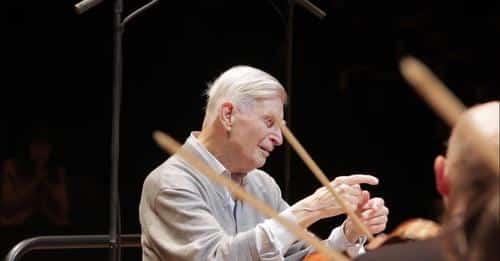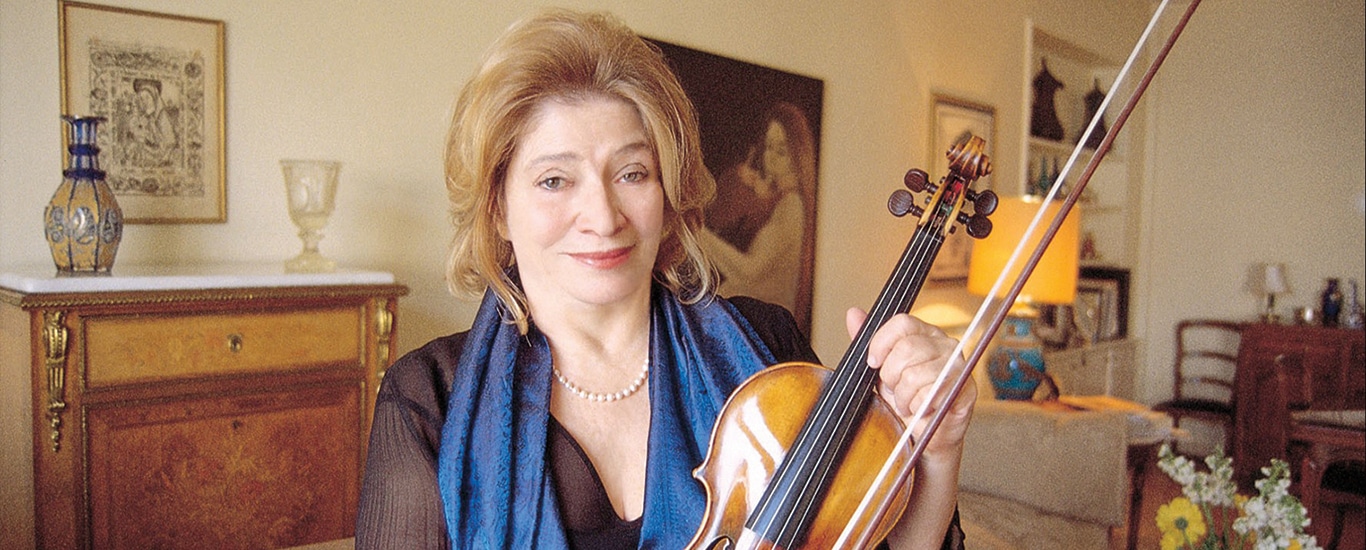Artificial Intelligence that composes music to order
mainIt’s called JukeDeck and it’s being puffed by the BBC World Service. The headline predicts that it could write a symphony….
The inarticulacy of the interviewer defies belief.
There’s another piece about it in the NY Times. The PRs have been working overtime.
Listen here.






The interviewer was propably as flabbergasted as any non-artificial intelligence would be. Why add more of such limonade music to the ocean of it that already exists? To relieve all those poor note scribblers from their handywork? But they use computer programmes already anyway. Interestingly, studies into this entirely nonsensical thing began already 50 years ago, which is in the same period that postwar modernism began its equally silly ideological brainstorming: all this stems from the modernist assumption that music is merely a rationally-putting together of learned tricks – as the majority of postwar avantgarde works demonstrate. If the computer programme, after these ample 50 years, has reached the stage where it can ‘compose’ the mind-numbing stuff heard in the video, it will need at least another 50 years to come-up with an equivalent of Le Marteau Sans Maitre, but to which end?
What people, wasting their life on these sort of enterprises are ignorant of, is that artificial ‘intelligence’ is merely the mechanics of intelligence, but not intelligence itself. Artificial intelligence often seems to be a property of its practitioners as well, demonstrating a thoroughly materialistic mind.
Music history is difficult to deal with because the greatest composers only follow trends to an extent. Often, they are involved in breaking trends and starting new ones or developing trends to a stage of perfection. “Genius”, a much abused term, is the ability to accomplish what others cannot “see”. Therefore, when one has a superficial understanding of a great composer and looks deeper, one often finds passages that seem atypical of that composer.
It is this kind of audacity that artificial intelligence could not reproduce. A robot could reproduce the mannerisms of a certain composer, but it could not create the unexpected turns that composers take. It is for this reason that it is necessary for composers to be thoroughly modern because otherwise they are just reproducing the mannerisms of older composers.
Boulez is not an automatic composer. He was just as spontaneous as any great composer, so your reference to artificial intelligence reproducing “Marteau” is no more valid than if your reference a Bach fugue or a Haydn sonata. Not only was Boulez imaginative as he composed, but he was not following trends, he was creating them. Therefore, while many composers did not survive the postwar modernist period (ex. Goeyvaerts, Pousseur, Stockhausen, etc.), Boulez did because he invented the style himself, and others just imitated him. And, Boulez transcended the style in his later years, and produced works such as Repons, Sur Incises, and Derive, which are suis generis.
“It is for this reason that it is necessary for composers to be thoroughly modern because otherwise they are just reproducing the mannerisms of older composers.” There is still much misunderstanding of this point. The Western musical tradition is an unfolding of mannerisms which are functioning as conventions, as in a language, and which are interpreted by composers according to their talent, temperament, authentic personality, locality, etc. etc. A music without something like a ‘common language’ will not be able to communicate. Composers who merely reproduce the mannerisms of older / earlier composers, don’t contribute to the existing repertoire, and they were legion during the ages. But they provided the context in which the better composers could develop. Mozart is unthinkable without his ample imitation of ‘mannerisms’ of his contemporaries and older composers like J.C.Bach, Haydn, the old JS Bach, and the many composers he heard on his youthful journeys. His ‘Haydn quartets’ do imitate Haydn’s language on purpose and they belong to the best of his works. Brahms and Mahler plundered existing older repertoire all the time but they gave it a personal twist. And so on and so forth…. So, it would be more sensible to say: “It is for this reason that it is necessary for composers to be thoroughly themselves because otherwise they are just using the mannerisms of older composers without giving them a personal, and thus new, meaning.”
PB took late Webern and Messiaen, removed the musical elements of their languages – in the case of Webern that did not need much work – and created a new sort of art with it, a so-called ‘opbjective’ art, where the meaning is in the medium itself. It was never meant for such ‘banal thing as communication’. Good for him! But he failed to make it part of the musical repertoire and his claims to produce music show that he did not understand that he was more modern than he thought.
By the way: the concept of ‘modern’ changes with the context. Neoclassicism was modern in the twenties, and imitation of Palladio in 18C England was very cutting edge too, in spite of the examples being 200 years old. Renaissance architects claimed to be modern in their time when they tried to revive antique culture, and the opera was a modern invention aimed at restoring the original Greek plays of 2000 years earlier. So, in our days it is not very modern to think that PB’s works are still modern, and in a time of cultural decline being modern is not a positive but a negative description.
“it will need at least another 50 years to come-up with an equivalent of Le Marteau Sans Maitre”
Heh heh. We see what you did there.
My PA, reading over my shoulder, does not understand. Maybe you could clarify, she has only natural intelligence.
Automatic composing algorithms ‘Hammer without a master’
(You could have selected some other Boulez piece)
I think it could be done – after 50 years – but then, we will have two hammers and which will be the original? There won’t be much difference.
http://subterraneanreview.blogspot.nl/2016/01/notes-on-boulez.html
“It’s not Beethoven, it’s not Mozart.”
Yeah no shit. That much was clear after two notes.
The saddest thing is, what percent of the population will be able to differentiate between this and Mozart?
But that is entirely irrelevant. Understanding music has always been the privilege of a minority, that is: in relation to the total of the population. The problem is that such IT nonsense is sold as a serious undertaking, by people without the slightest cultural awareness, and it won’t inspire musical illiterati to visit a classical music concert.
I have been studying (Postgrad), researching and developing neural networks for
over 20 years. Here is my opinion:
1. Religion is at the heart of AI denial. Those who believe that we are special,
formed in some god’s image, have no choice but to deny the potential of AI.
I believe that consciousness is an emergent property, a whirring in the machinery of learning.
2. Advances in hardware, particularly in memory density, possibly in quantum computing,
enable AI platforms to surpass the potential of our mammalian brains.
3. There is no rational argument denying that AI could surpass human musical composition ability,
and the corollary, the ability to appreciate music.
The interesting question for me (in the context of this forum) is this:
What musical taste is a superhuman intelligence likely to assume?
If the neural net is evolved/grown with a benevolent desire to understand humanity
(seems like a good idea..), which will it find more interesting:
a. The mechanical complexity of Bach,
b. The chaotic impetuousness of Jazz, or
c. The statistically significant impact of the popular?
Where lies the key to understanding the human condition?
Does it feel uncomfortable, being the object of study instead of the student?
Thank you for exposing the problem of Artificial Intelligence. The understanding, interpretation and communication of factual evidence is highly dependent upon language, hence the many misunderstandings between people operating in different fields of intelligence (there is not one intelligence, there are very many types).
At the heart of the misunderstanding is the fact, that human consciousness is still entirely unexplained. We know what it is, since we are conscious, but to step out of our consciousness to be able to examine it, is impossible since we would need consciousness to examine it. What happens in the human brain cannot explain consciousness, since what any MRI scan can tell us is the ‘mechanics’ of consciousness. Explaining consciousness through its mechanics is something like explaining the radio programme by showing the workings of the radio set. So, here we bump into a philosophical rather than a scientific problem, and must admit that the attempt to only see the radio set does not explain anything about its function in terms of meaning.
AI functions through quantifiable material, breaking-up things in numbers and putting them togehter in another way. So, also if AI can reproduce the workings of a musical symphony, it will never be able to write a work with some aesthetic / artistic quality, since those qualities are not quantifiable (many of man’s mental activities are non-quantifiable). However complex and developed AI can become, it still will be a mechanical machine-like imitation of only the workings of human consciousness, and entirely unconsciousness as any steam machine is. But surely it can write sonic art, since that is a quantifiable sort of art, easy to imitate.